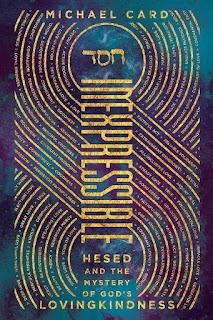Hesed is a Hebrew word used over 200 times in the Old Testament to describe God’s character, His works, and His people. It is notoriously difficult to translate, not because it is obscure but because it is so rich in meaning. No single English word can do the job. Some of the most common translations include: mercy, kindness, love, lovingkindness, steadfast love, faithfulness, and loyalty. Here are just a few examples:
“‘The Lord is slow to anger and abounding in steadfast love [hesed], forgiving iniquity and transgression, but He will by no means clear the guilty, visiting the iniquity of the fathers on the children, to the third and the fourth generation.’ Please pardon the iniquity of this people, according to the greatness of Your steadfast love [hesed], just as You have forgiven this people, from Egypt until now” (Num. 14:18-19 ESV).
“Know therefore that the Lord your God is God, the faithful God who keeps His gracious covenant loyalty [hesed] for a thousand generations with those who love Him and keep His commands” (Deut. 7:9 CSB).
“Lord God of Israel, there is no God in heaven above or on earth below like You, who keep Your covenant and mercy [hesed] with Your servants who walk before You with all their hearts” (1 Kings 8:23 NKJV).
“Surely Your goodness and unfailing love [hesed] will pursue me all the days of my life, and I will live in the house of the Lord forever” (Psalm 23:6 NLT).
“Your lovingkindness and graciousness [hesed], O Lord, extend to the skies, Your faithfulness [reaches] to the clouds” (Psalm 36:5 Amp).
In the New Testament the concept of hesed appears in Jesus’ life and teaching (e.g Matt. 9:13, Matt. 20:14-15, Luke 10:36-37). God’s love and mercy are meant to overflow in our lives so that we show the same love and mercy to the world around us.
Late one night as I was pondering what I’d been reading, I pictured myself examining a cup of water and thinking I understood water while being oblivious to the ocean beside me. I think that’s a bit like our understanding of God’s love in the church. We talk about it, sing about it, and proclaim it to others, but we only know one teacup of the vastness of His steadfast love toward us. And because of our anemic understanding of God’s love, our own love is often shallow and feeble. To use the Apostle Paul’s words in Ephesians 3:18-19, we need to “have the strength to comprehend with all the saints what is the breadth and length and height and depth, and to know the love of Christ that surpasses knowledge, that you may be filled with all the fullness of God.”
The book concludes with this thought,
“God commands his people to do justly and to love hesed [Micah 6:8]. We struggle with both. If it were simply a matter of doing justly or loving hesed, we might be able to come up with a formula, a set of rules to follow. But the two must function together. We can do justly only by loving hesed. The doing must flow from the loving. And the loving is a response, as love is always a response, to the God of Exodus 34, who is full of hesed and at the same time does not leave the guilty unpunished… In Jesus of Nazareth, the embodiment of hesed, God was perfectly just and perfectly merciful. Through Jesus he fulfilled the promise to not leave the guilty unpunished by placing that punishment on Jesus in an act of pure and perfect hesed. Jesus did justice by loving hesed. He gave himself so that we might be conquered by the kindness of God, a kindness that leads us to repentance, that draws us to the cross… The final challenge to you and me is to take whatever understanding we have in our heads of hesed and allow the Spirit to move it into our hearts. We must enter into the world of the word hesed and then take that world into our world, back to our families, to our churches and towns—to our enemies. The Scriptures are offering us an unimaginable opportunity to make Jesus believable and beautiful by offering everything (even our very lives) to those who have a right to expect nothing from us.” (133-135).
Some time back I memorized the first three verses of Psalm 136 in Hebrew. (You can find anything on YouTube!) At the time I did not realize that they contain a version of the word hesed, since I’m not a Hebrew scholar. Those verses have often brought comfort in the middle of the night, and now that I have a somewhat fuller understanding of God’s hesed love and faithfulness I will cherish them even more.
“Give thanks to the Lord, for He is good, for His steadfast love endures forever. Give thanks to the God of gods, for His steadfast love endures forever. Give thanks to the Lord of lords, for His steadfast love endures forever” (Psalm 136:1-3).
© 2022 Dawn Rutan. Unless otherwise indicated, all Scripture are ESV. Cover art courtesy of Amazon.com. The opinions stated do not necessarily reflect the views of my church or employer.


